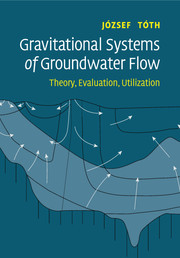Book contents
- Frontmatter
- Contents
- Preface
- 1 Introduction
- 2 The ‘Unit Basin’
- 3 Flow patterns in composite and heterogeneous basins
- 4 Gravity flow of groundwater: a geologic agent
- 5 Practical applications: case studies and histories
- 6 Epilogue: gravitational systems of groundwater flow and the science of hydrogeology
- Glossary
- References
- Appendices
- Appendix A
- Appendix B
- Index
6 - Epilogue: gravitational systems of groundwater flow and the science of hydrogeology
Published online by Cambridge University Press: 31 July 2009
- Frontmatter
- Contents
- Preface
- 1 Introduction
- 2 The ‘Unit Basin’
- 3 Flow patterns in composite and heterogeneous basins
- 4 Gravity flow of groundwater: a geologic agent
- 5 Practical applications: case studies and histories
- 6 Epilogue: gravitational systems of groundwater flow and the science of hydrogeology
- Glossary
- References
- Appendices
- Appendix A
- Appendix B
- Index
Summary
Hydrogeology can be defined today as the science and practical utilization of those processes and phenomena that result from the interaction between groundwater and the rock framework. However, with its broad scope and multifarious applicability modern hydrogeology is fundamentally different from what it was before the 1960s. In those days, it was a single-issue subject of providing water supplies from subsurface sources.
The multitude and diversity of the various, and in some cases seemingly unrelated, processes, phenomena and issues presented in the preceding pages may obscure the fundamental and abrupt change in the scope of hydrogeology caused by the concept of gravity-driven groundwater flow systems. The intent of this chapter is, therefore, to put the previous five chapters into a concise historical context. To this end, the chronological evolution of some groundwater related conjectures, theories, knowledge and technical approaches will be reviewed briefly from the perspectives of the natural sciences and engineering sciences.
Hydrogeology matured suddenly into a fully fledged member of the earth sciences during the remarkably short period of approximately 30 years between the late 1950s and early 1980s. Prior to 1960, the discipline was the realm chiefly of the geologist, a natural scientist with little or no interest and background in the quantitative statements of the laws and factors controlling the flow of groundwater, let alone the differential equations describing them.
- Type
- Chapter
- Information
- Gravitational Systems of Groundwater FlowTheory, Evaluation, Utilization, pp. 244 - 247Publisher: Cambridge University PressPrint publication year: 2009



